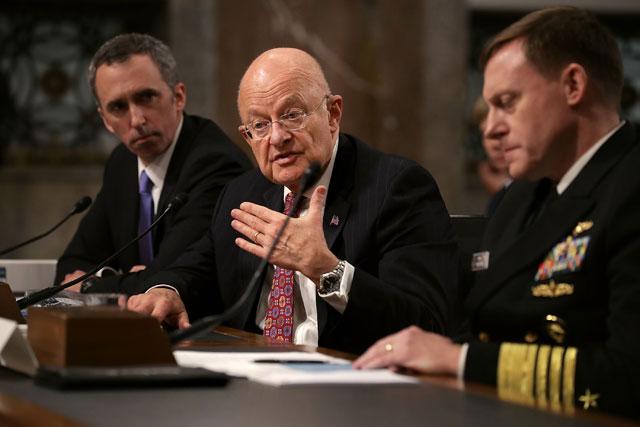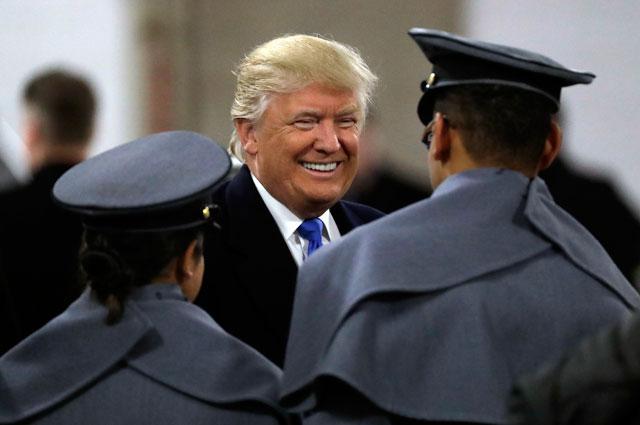You are here
US spy chiefs see ‘multifaceted’ Russian bid to disrupt election
By AFP - Jan 05,2017 - Last updated at Jan 05,2017

Left to right: Defence Undersecretary for Intelligence Marcell Lettre II, Director of National Intelligence James Clapper and US Cyber Command and National Security Agency Director Admiral Michael Rogers testify before the Senate Armed Services Committee in the Dirksen Senate Office Building on Capitol Hill on Thursday in Washington, DC (AFP photo)
WASHINGTON — US spy chiefs said on Thursday that the hacking of Democratic Party computers was just one part of a multifaceted campaign by Russia to disrupt the American presidential election.
In a closely-watched Senate hearing, top intelligence officials presented a united front as they reiterated their conclusion that Moscow interfered with last year’s campaign and that its cyber-meddling poses a “major threat” to the United States — findings that President-elect Donald Trump has so far refused to accept.
“This was a multifaceted campaign. So the hacking was only one part of it, and it also entailed classical propaganda, disinformation, fake news,” Director of National Intelligence James Clapper told the Senate hearing.
While Trump continues to question the evidence of Russian meddling, Clapper, National Security Agency chief Michael Rogers and Marcel Lettre, undersecretary of defence for intelligence, told the committee they are convinced that Moscow is aggressively targeting the United States in offensive cyberspace activities.
“We assess that only Russia’s senior-most officials could have authorised the recent election-focused data thefts and disclosures,” they said in a joint statement to the Senate Armed Forces Committee.
“Russia is a full-scope cyber actor that poses a major threat to US government, military, diplomatic, commercial and critical infrastructure and key resource networks,” they said.
In the first public hearing dealing with Russia’s alleged interference since the allegations first came out in October, Clapper said such cyber threats are “challenging public trust and confidence in information, services and institutions”.
“Russia has clearly assumed an even more aggressive cyber posture by increasing cyber espionage operations, leaking data stolen from these operations and targeting critical infrastructure systems,” he said.
Trump to get Russia briefing
The incoming Republican president has repeatedly cast doubt on the intelligence community’s assessment that Moscow was behind the hacking of Democratic Party computers to leak documents and e-mails that would damage Trump’s rival Hillary Clinton in November’s election.
But asked in the hearing to provide more proof of their conclusion, Clapper said he could not reveal details publicly.
Trump will be briefed Friday by the heads of the CIA, FBI and DNI on the evidence behind their conclusion on Russia election interference. And a declassified version of a report produced for the White House on the case is expected to be released next week.
The president-elect has raised the ire of the intelligence community by questioning the record of the CIA, FBI and other agencies in providing solid assessments to the government.
On Wednesday he raised more hackles by citing WikiLeaks founder Julian Assange in once more dismissing the conclusion that Russia was behind last year’s Democratic Party hacking.
Without naming Trump, Clapper said he had fielded many queries from international colleagues over the recent “disparagement” of the intelligence community.
“Public trust and confidence in the intelligence community is crucial,” he said.
Asked about Assange’s credibility, Clapper said his publication of leaked materials had “put people at risk”.
“I don’t think those of us in the intelligence committee have a whole lot of respect for him,” Clapper said.
The three spy chiefs also said that, despite having agreed in 2015 to halt its own cyber attacks on the US government and companies, China also continues such activities, albeit it at a lower level.
“Beijing continues to conduct cyber espionage against the US government, our allies, and US companies,” they said.
“China continues to integrate and streamline its cyber operations and capabilities into a dedicated cyber element that will be increasingly difficult to detect or counter,” they said.
Related Articles
WASHINGTON — President-elect Donald Trump dismissed a brewing storm over Russian cyber meddling in the US election, rejecting as "ridiculous
WASHINGTON — President Barack Obama’s decision to identify Russia as almost certainly the culprit in hacking the Democratic National Committ
LONDON — The United States urged two senior British judges on Wednesday to clear the extradition of WikiLeaks founder Julian Assange and rej













